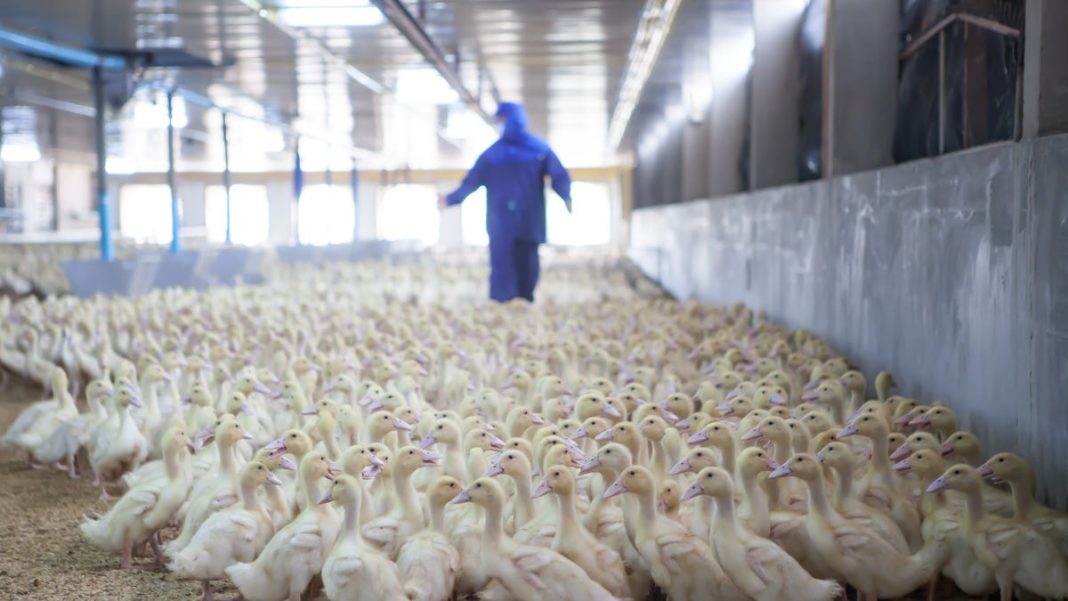Over 100,000 Ducks to be Euthanized at New York Farm Due to Bird Flu Outbreak
A farm on Long Island is set to euthanize over 100,000 ducks following an outbreak of bird flu at their facility.
According to Newsday and local news station WABC-TV, staff at Crescent Duck Farm in Aquebogue, New York, observed that many of the ducks were sick. Subsequent tests confirmed cases of the highly pathogenic avian influenza (HPAI), which has been affecting humans, pets, and poultry throughout the U.S.
Doug Corwin, president of Crescent Duck Farm, expressed the deep sadness felt over the euthanasia decision, noting that Long Island has a rich history of duck farming. This farm is the largest commercial duck operation in Suffolk County and one of the last remaining on Long Island, as reported by WABC.
The family-run farm has been in business since 1908, as stated by WABC.
“We keep a close eye on our flock, monitoring them three times a day. One day, I saw some birds that appeared lethargic and out of sorts,” Corwin shared with Newsday. “This farm represents my family’s legacy. We are a significant part of Long Island’s heritage, and I never wanted it to conclude in this manner.”
However, Suffolk County Health Commissioner Gregson Pigott emphasized that the entire flock must be culled for public health reasons.
“When a flock is infected like this, the only solution is to euthanize the entire group,” he explained.
Bird Flu Detected at Georgia Poultry Plant
Recently, bird flu was found in a commercial poultry plant in northeastern Georgia, marking the fifth confirmed HPAI case in the state and the first in a commercial facility, according to state officials.
This case occurred at a facility in Elbert County, affirmed by the Georgia Department of Agriculture on Friday, alongside the U.S. Department of Agriculture.
As a precaution, officials imposed a quarantine on all commercial poultry operations within a 6.2-mile radius and planned surveillance testing for at least two weeks. Meanwhile, all in-state poultry exhibitions, shows, swaps, meet-and-greets, and sales have been suspended until further notice, stated the department.
“This is a significant threat to Georgia’s leading industry and the livelihoods of thousands who depend on our poultry sector,” said Tyler Harper, the state agriculture commissioner, in a statement. “We are working tirelessly to prevent any further spread of the disease and to allow normal poultry operations in Georgia to resume as soon as possible.”
Bird Flu: Key Information
Bird flu has been present globally since 1997 but had remained largely among wild birds until more recently. The current strain, H5N1, which originated in Europe in 2020, is recognized as the largest avian flu epidemic in that region, and it has spread to Africa, the Middle East, and Asia.
The H5 bird flu strain made its way to the U.S. in late 2021. The Centers for Disease Control and Prevention (CDC) reports that since April 2024, there have been 61 confirmed human cases of H5 bird flu in the U.S.
Earlier this month, the Louisiana Department of Public Health reported the first U.S. death from bird flu as of January 6, involving a patient over the age of 65 with pre-existing health conditions.
In December, concerns over bird flu prompted a recall of a line of cat food from Northwest Naturals after authorities linked a cat’s death to contaminated feed. The USDA has also started nationwide testing of milk in response to bird flu outbreaks in dairy herds.
The proliferation of bird flu among U.S. poultry is also contributing to an increase in egg prices. As of January 6, the virus has affected more than 138 million birds across all 50 states since January 2022, according to the CDC.

